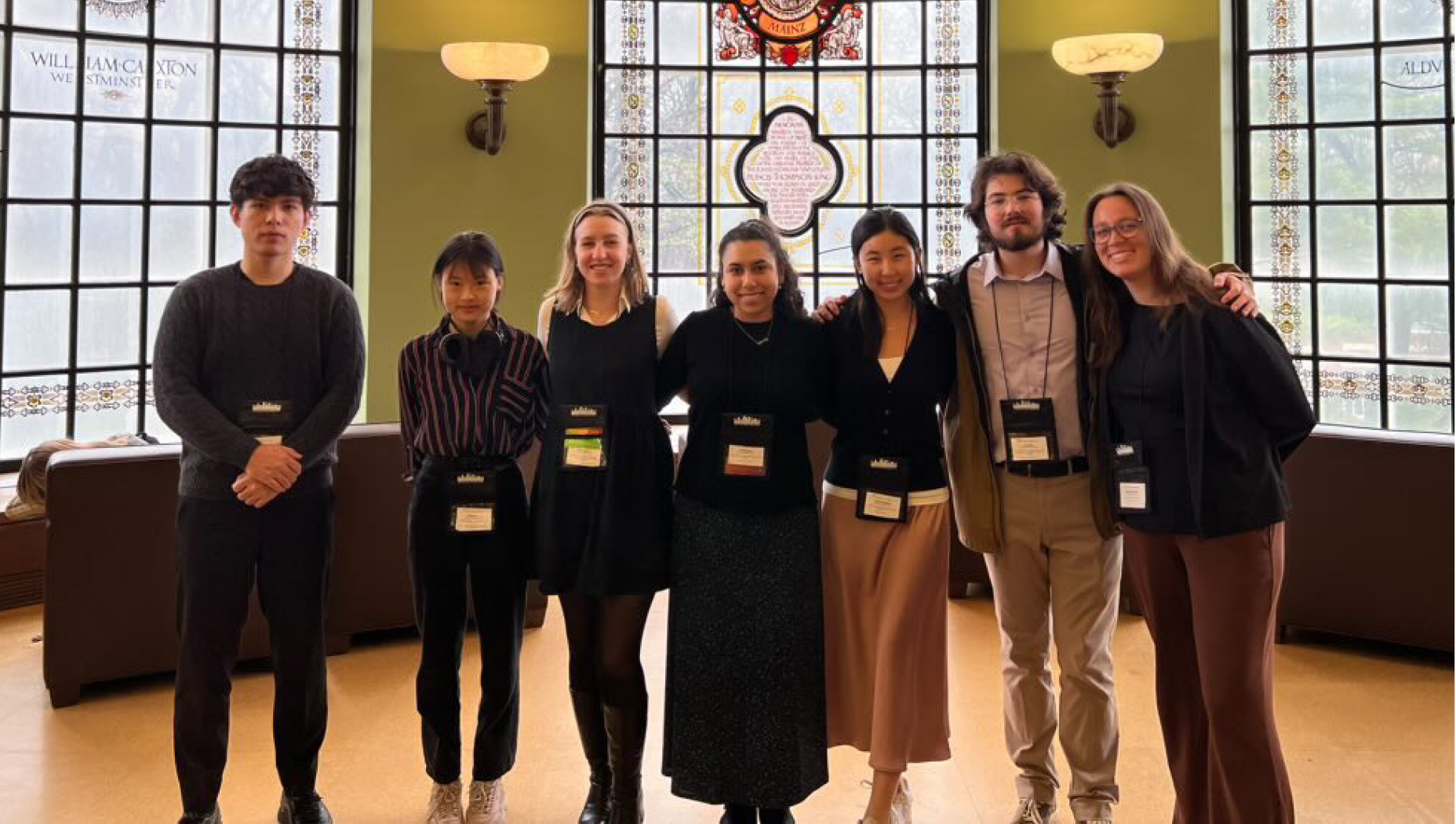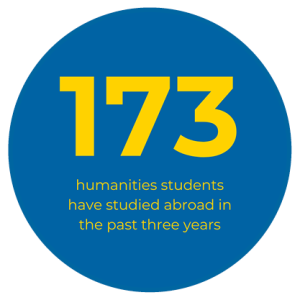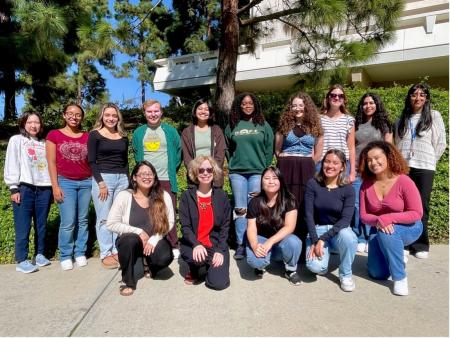
By Nikki Babri
Through a suite of innovative experiential learning programs, UC Irvine’s School of Humanities is equipping students with the skills, experiences and confidence to thrive in an ever-evolving professional landscape.

Experiential learning, at its core, is the process of learning through experience and reflection. At UCI, it is a comprehensive approach that includes undergraduate research opportunities, digital humanities projects, professional internships, study abroad programs and more. These funded initiatives are not peripheral to the curriculum; they’re integral components of a holistic education that prepares students for the challenges and opportunities of the 21st century.
Digital Humanities: Embracing technology
As the humanities continue to evolve in the digital age, UCI is leading the way with its Undergraduate Summer Fellowship in Digital Humanities (USFDH). In the digital humanities, scholars use a variety of digital means, including visualizations, GPS mapping, database construction, AI applications and virtual and augmented reality, to research problems in history, art, literature, film and other disciplines. Students in the USFDH program gain hands-on experience utilizing digital tools and platforms to reimagine how humanities research can be conducted, presented and disseminated in the digital era.

Sissi Kang, a second-year student majoring in art history, participated in the ten-week program in summer 2024. Kang believes her background in art history equipped her with a strong sense of visual analysis and historical understanding – skills that were especially useful when creating a timeline spanning over 60 years that examined the development of psychoanalysis and its influence on art, media and consumer culture.
“I utilized tools like the Knight Lab Timeline to visualize the evolution of the film industry from the 1960s to the present, highlighting the rise of feminism within traditionally male-centric cinema,” Kang explains. The fellowship also gave Kang opportunities to work with various media forms including Google Sites, YouTube, TikTok and Reels, allowing her to embed multimedia sources into one website and create an immersive learning experience.
The USFDH offers students a stipend to learn about digital humanities, develop a project prototype with support from librarians and faculty and present their work in a public showcase.
These projects are tailored to their individual research interests and academic passions, resulting in unique and innovative work. For example, fourth-year history and gender and sexuality studies student Lily Amidon’s project was a feminist analysis of the Star Wars movie franchise.

Amidon sees digital humanities as a natural extension of traditional humanities skills. She shares how the writing and research skills she learned in her humanities classes taught her how to think critically, design research projects and write academically. These skills, she believes, will translate seamlessly to digital platforms and be instrumental in her future work as a graduate student and professor. “Digital humanities articulate the same skills and information in a new format,” Amidon observes. “It’s almost like a lateral translation of humanities skills to a new medium. The tools are mostly the same, the format just changes.”
This fusion of traditional humanities research with digital presentation skills prepares students for a wide range of professions where digital storytelling and data analysis are increasingly valued. “I believe these digital tools will be invaluable in future art history work, such as digitizing artwork for museums and exhibitions and sharing specialized knowledge with a broader audience through digital media,” Kang adds.
Undergraduate Research: A platform for budding scholars
UCI's commitment to undergraduate research is exemplified by programs like the Undergraduate Research Opportunities Program (UROP), while also extending to national platforms such as the Richard Macksey National Undergraduate Humanities Research Symposium, where students travel to Johns Hopkins University to present their original work alongside peers from across the country.
Students find that the symposium offers more than just a platform for presentation. It’s an immersive experience in the world of academic conferences, complete with the excitement of travel, the challenge of fielding questions from new faces and the thrill of engaging in discussions with fellow passionate scholars.

Recent graduate Emily Schoeff ‘23 (B.A. English) found that the Macksey Symposium sharpened her research presentations. “Presenting to an audience completely unfamiliar with my research pushed me to consider the key details of my research. It also strengthened my public speaking, which is something I struggled with previously,” reflects Schoeff, who also presented at the UROP showcase. She credits her success to the strong foundation in interdisciplinary research and critical thinking built through Humanities Core and English courses, which allowed her to explore her interests and approach her honors research with confidence.
This sentiment is echoed by many participants who return from the symposium with improved presentation skills, a broader perspective on their field of study and, often, a renewed passion for their research. Moreover, the symposium provides invaluable networking opportunities, allowing students to forge connections with peers and professionals from diverse institutions, expanding their academic and professional networks beyond UCI.

“Getting to see the fruits of my research was incredibly rewarding,” shares Spiro Sun ‘24 (B.A. history), who traveled to Baltimore to present at the Richard Macksey Symposium. “The Symposium and UROP also allowed me to network and meet my fellow peers in various humanities studies.”
These research opportunities not only showcase students’ work but also foster a collaborative academic environment, which is particularly valuable for students from diverse educational backgrounds.
For Amidon, a transfer student from community college, UROP and the Macksey Symposium offered her the first taste of collaborative academic work. “My past research projects were independent, so having group experiences and faculty advisors at UCI was new to me,” she shares. This transition to a more collaborative research environment mirrors the teamwork often required in professional settings post-graduation.
Internships: Introducing students to the professional world
Closer to home, internships provide students with a direct bridge between academic study and professional application. The School of Humanities offers a range of paid internship programs designed to leverage the unique skills humanities students bring to the table. To build a strong foundation for students, the school also offers a professional development course (Humanities 95) that equips undergraduates with career readiness skills by introducing them to internship and research opportunities while preparing them for experiential learning in the humanities field.
The Internships for English Majors Program, founded in 2021 to enhance the employability of UCI English majors, positions students in roles in marketing, communications and adjacent fields in positions on and off campus. Students are immersed in roles where their skills in analysis, writing and critical thinking are put to immediate use.

For Schoeff, this experience opened up new career possibilities. “The English internship pushed me to explore communications jobs that I previously had not considered,” she admits. This exploration led to a temporary role with the School of Humanities Communications Team after graduation.
The History Internship Program similarly places students with a range of local partners and offers students exposure to different facets of public history. Along with gaining direct experience using their historical research and writing skills, students will hone essential professional skills, from crafting résumés and cover letters to navigating workplace dynamics and communication.
Sun found his internship with the UCI History Project particularly illuminating. “As an aspiring future teacher, getting to work with the UCI History Project led me to have a greater understanding about curriculum development, the process behind it and the ways in which this manifests itself in humanities education,” he reflects.
Many students find that these experiences clarify their career aspirations, while others discover new passions that lead to unexpected career opportunities. Either way, graduates of UCI’s humanities programs enter the job market with a portfolio of real-world experiences, a network of professional contacts and a clear understanding of how to leverage their unique skills.
Interested in reading more from the School of Humanities? Sign up for our monthly newsletter.
